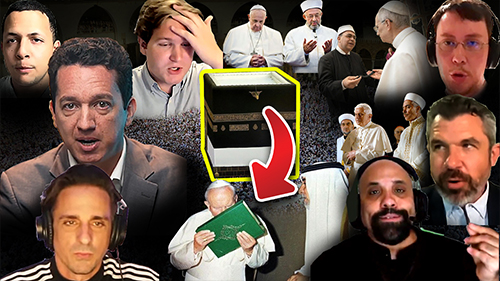| Recent Featured Videos and Articles | Eastern “Orthodoxy” Refuted | How To Avoid Sin | The Antichrist Identified! | What Fake Christians Get Wrong About Ephesians | Why So Many Can't Believe | “Magicians” Prove A Spiritual World Exists | Amazing Evidence For God | News Links |
| Vatican II “Catholic” Church Exposed | Steps To Convert | Outside The Church There Is No Salvation | E-Exchanges | The Holy Rosary | Padre Pio | Traditional Catholic Issues And Groups | Help Save Souls: Donate |  |









 " />
" /> " />
" /> " />
" /> " />
" /> " />
" />




How Can Baptism Of Desire Be Contrary To Dogma When...
OBJECTION- How can baptism of desire be contrary to dogma when a saint such as St. Alphonsus believed in it after the Council of Trent? That would make him a heretic, which is impossible since he is a canonized saint.
ANSWER- First, the key to heresy is obstinacy/pertinacity. It is a fact that a man (if he is not obstinate) could hold a position that is heretical, such as the idea that Christ only has one will, without being a heretic (unless the man came to depart from the essential belief in the Trinity and Incarnation; in that case, even if he were not obstinate, he would lose the Catholic Faith). Most of the traditional Catholics with whom I’ve spoken believe that Christ only has one will, not two. That is heresy condemned by the Church. Christ has two wills (not in conflict), since He is God and man. So, were all of these traditionalists that I spoke with heretics? No, because they weren’t aware of this dogma, or didn’t understand it completely, and were not pertinacious and still held their essential belief in Jesus Christ as God and man. But if they were pertinacious or obstinate about the issue then they would have become heretics.
The same principle might apply not only to a dogma of which one is unaware, but also to a text that might be misread on a matter that pertains to dogma or heresy. Is there any proof of this? Yes.
Most of us know the case of Pope Honorius I, who was condemned many years after his death for (at least) furthering the monothelite heresy (that Christ has only one will). Pope Honorius I (630-638) was condemned after his death by the Third Council of Constantinople in 680. But Pope John IV, who reigned shortly after Honorius, attempted to defend Honorius’s letters and even said that it’s “altogether contrary to the truth” to assert that Honorius taught that Christ has only one will.
Okay, here we have a Catholic pope defending the two letters of Honorius which were later condemned by dogmatic councils. This proves that one can remain a Catholic (even the pope!) while wrongly attempting to justify as Catholic something that, in fact, is worthy of condemnation.
Some may respond: “well, Pope John IV lived before the infallible condemnation of Honorius’s letters was published; that’s why he was not a heretic for defending these letters which furthered heresy.”
This is a specious response. The Third Council of Constantinople condemned Honorius based on letters he wrote during his reign. Pope John IV was looking at the very same letters and statements that the Third Council of Constantinople condemned. So, looking at the very same statements, Pope John IV (in his fallible capacity) and The Third Council of Constantinople (in its infallible capacity) said two drastically different things. This proves that one can misunderstand as Catholic something that, in fact, is heretical or favoring heresy and remain a Catholic, if there is legitimate reason for confusion. [Of course, this wouldn’t apply to blatantly obvious points, such as the necessity of Protestants to convert or that pagan religions are false (such as the Vatican II antipopes deny), but only finer points of dogmatic issues or matters on which some confusion or reason for confusion might exist.]
The same is true with baptism of desire – or, to be more precise, the version of baptism of desire which was held by certain saints for unbaptized catechumens only. Just like Pope John IV misunderstood the letters of Pope Honorius in good faith, these saints misread Sess. 6, Chap. 4 of the Council of Trent. They thought that it taught baptism of desire, and therefore they (wrongly) taught baptism of desire. However, when one scrutinizes their arguments and closely examines the teaching of Sess. 6, Chap. 4, one sees that the Council of Trent doesn’t teach baptism of desire. One also discovers that there is no evidence for baptism of desire in the infallible teaching of the Church. One further discovers that baptism of desire cannot be squared with numerous facts from the infallible teaching of the Catholic Church. Thus, once one sees these points clearly explained, one has an obligation to abandon such a false opinion which is at variance with so many facts. One cannot continue, at that point, to insist that men can be saved without Baptism. The points covered above prove that a saint or a pope could misread a text and, based on that misreading, teach something that is contrary to the Faith in good faith.
In conclusion, whether one wants to call baptism of desire a heresy or a grave theological error incompatible with dogma, the fact is that it is a false opinion which cannot be reconciled with numerous infallible definitions and no Catholic should hold it at all after seeing these facts.
Moreover, while any idea of baptism of desire is false, one must make a very important distinction between the version of baptism of desire held by certain saints (for unbaptized catechumens only) and the version held by most today (which will be covered in more detail later in the book). The saints who held baptism of desire only applied it to unbaptized catechumens who believed in the Trinity, the Incarnation and the Catholic Faith. Almost all who believe in it today apply it to those who don’t even believe in Christ and/or are members of false religions. Those who believe in this latter idea (that baptism of desire can apply to Jews or Muslims, etc.) would have to immediately abandon it upon seeing any of the infallible definitions on Outside the Church There is No Salvation. If not, they are definitely heretics who have been automatically excommunicated from the Church. One could not reasonably believe that members of non-Catholic religions being saved is compatible with Outside the Church There is No Salvation.
On the other hand, since the false idea that unbaptized catechumens can be saved was held by certain saints and taught in the fallibly capacity of other texts, those who hold baptism of desire as those certain saints did (i.e., for unbaptized catechumens only) would have more room for erring in good faith (reasonably thinking for a time that it was the traditional teaching of the Church) until all the aspects of the issue were presented to them.
Endnotes:
[1] Denzinger 253.
Sign up for our free e-mail list to see future vaticancatholic.com videos and articles.
Recent Content
^